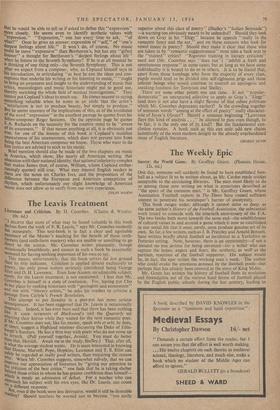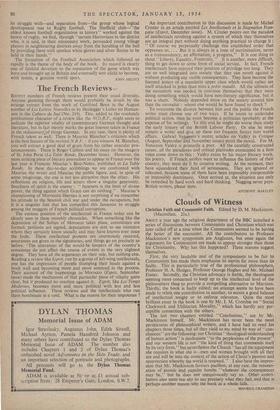The Weekly Epic
ONE day, someone will suddenly be found to have established foot- ball as a subject lit to be written about, as Mr. Cardus made cricket acceptable to the circulating libraries. The man most likely to do so among those now writing on what is sometimes described as "the sport of the common man," is Mr. Geoffrey Green, whose Association Football reports in The Times have roused sufficient interest to penetrate his newspaper's barrier of anonymity.
This book ranges wider, although it cannot delve so deep, as the same author's History of the Football Association, the substantial work issued to coincide with the ninetieth anniversary of the F.A. The two books both move towards the same end—the establishment of cultural values in and around a game which is now so established in our social life that it must, surely, soon produce genuine art of its own. So far, a few writers, such as J. B. Priestley and Arnold Bennett, have written briefly about football as incidental to a Yorkshire or Potteries setting. Now, however, there is an opportunity—if not a demand no less serious for being unvoiced—for a writer who can capture the hopes, angers and fears, the aesthetic, as well' as the partisan, reactions of the football supporter. His subject would be, in fact, the epic within the working man's week. The author who could evoke the emotions aroused by the football pools—but perhaps that has already been covered in the story of King Midas.
Mr. Green has written the history of football from its evolution and formulation out of the various local forms of football played by the English public schools during the last century, leading to
its struggle with—and separation from—the group whose logical development was to Rugby football. The Sheffield club—"the oldest known football organization in history" worked against the heresy of rugby, we find, through "certain Harrovians in the district who, it is said, in their missionary work, persuaded young village players in neighbouring districts away from the handling of the ball by providing them with spotless white gloves and silver florins to be held in their hands."
The formation of the Football Association which followed so rapidly is the theme of the body of the book. Its record is clearly one of faithful devotion to the reputation of the game which was born and brought up in Britain and eventually sent afield to become,
with tennis, a genuine world sport. JOHN ARLOTT



































 Previous page
Previous page